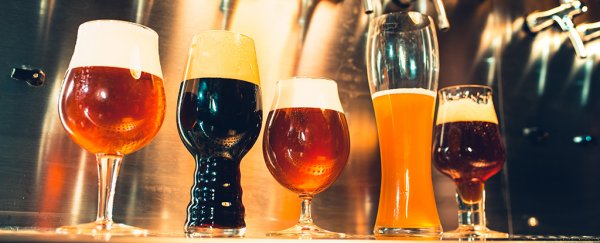We've known for a while that for some people, the urge to drink is wired into their genes. But new research shows that heavy alcohol use might actually change the function of genes linked to drinking behaviour, potentially fuelling a future of addiction.
A study conducted by researchers from Rutgers University has associated chemical changes in two significant genes with heavy and binge drinking in adults. Their results could help to explain why alcohol ranks as one of the world's most addictive substances.
Around one in five of those who enjoy a tipple will develop a dependence on alcohol. That figure isn't as high as it is for nicotine addiction, but it is slightly more than cocaine, and more than double the number for cannabis.
For a substance that can leave most of us feeling like the wrong end of death the next morning, it's surprising so many keep going back for more.
Clearly it's pleasurable for members of our species. As a depressant it removes inhibitions and kicks our pleasure centres up a gear. But while most people know when to call it quits, many return again and again for another dose.
Past studies hint at genetic influences affecting how our brains respond to the pleasurable qualities of alcohol. In fact, there's no shortage of studies searching for genetic ties to alcohol addiction, with a history of research demonstrating the complexity of inheritance and dependency.
One example is a gene called Per2, involved in regulating circadian rhythms and certain brain functions.
Studies in mice have shown how a mutated version can launch a biochemical cascade that inspires a predilection for alcohol. This gene has also been linked with increased drinking in teenage boys.
Along with another gene for a stress-response protein called hypothalamic proopiomelanocortin (POMC), Per2 was analysed in blood samples taken from 47 volunteers who were taking part in a larger experiment on drinking behaviours.
The group was made up of non-smoking beer drinkers who confessed to being either moderate consumers, alcohol bingers, or heavy drinkers.
Subjects were admitted to a three-day stay in hospital where they spent short periods watching intense imagery designed to elevate their stress, neutral pictures, or alcohol-related scenes, followed by a 'taste-test' beer drinking session.
While the volunteers were told they were sampling beverages to determine which of them matched, they were in fact being measured for their drinking appetite.
Pooled together, there were no real surprises when it came to the amount of alcohol consumed. Compared with the moderates, binge- and heavy drinkers required a few more tastes to work out which beers were which. A questionnaire also backed up their desire to reach for another glass or two.
The imagery, it turned out, made no real impact on their thirst – the drinkers were inclined to down a few more beers regardless of what they'd watched.
A larger study might tease out smaller details, but the researchers admitted their sample size wasn't quite up to revealing any differences that might exist. The numbers were also heavily skewed towards men, which needs to be taken into consideration.
But the blood samples did reveal a tendency for Per2 and POMC genes among the binge- and heavy drinkers to be methylated.
This process of gumming up a gene with a molecule is described broadly as an epigenetic change. The gene's code remains the same, but its expression is altered. In this case, the methylation forced the genes to decrease their expression.
On its own, this study doesn't demonstrate a clear cause and effect. Epigenetic changes can be brought on by a range of environmental factors, of which alcohol could be just one.
It's possible both genes had been locked up by stress, or were even inherited from their parents.
But taken with previous research on the influence of alcohol consumption on Per2 genes, it's a fair bet that drinking heavily leads to epigenetic changes that in turn drive up those cravings.
"We found that people who drink heavily may be changing their DNA in a way that makes them crave alcohol even more," says Rutgers University endocrinologist Dipak K. Sarkar.
"This may help explain why alcoholism is such a powerful addiction, and may one day contribute to new ways to treat alcoholism or help prevent at-risk people from becoming addicted."
Partly thanks to its legality and image as a socially acceptable drug, it's easy to overlook the impact of alcohol on society, especially when compared with more illicit substances.
Identifying how alcohol changes our biology – for better and for worse – is essential if we're to find ways to help people make sound decisions about their drinking habits.
This research was published in Alcoholism: Clinical & Experimental Research.
